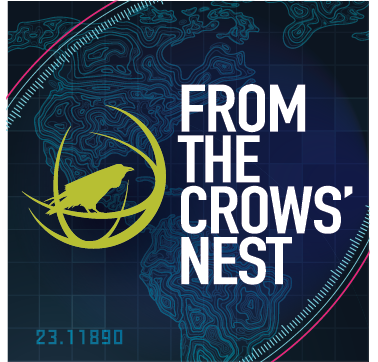
US Secretary of State Antony J. Blinken traveled to China this week, so we’re revisiting a conversation between From the Crows’ Nest host Ken Miller and Dean Cheng, a senior advisor for the US Institute of Peace and senior fellow at the Potomac Institute. The US-China competitive relationship is very complex, reaching every aspect of society, the economy, and the military. Ken and Dean discuss China’s approach to intelligence gathering, their long-term goal and end game, and the greater implications of the China-Taiwan conflict. They also discuss how China is capitalizing on the Russia-Ukraine War and approaching oil production in the Middle East. Below is a snippet of their conversation, but click here to listen to the full episode.
To view all recent episodes, visit crows.org/FromtheCrowsNest, or subscribe to From the Crows Nest wherever you listen to podcasts.
Ken Miller: So with the establishment of the information dominance, a lot of times in our conversation we talk US versus China, but if you look at how China is conducting this policy, you see them involved integrally in so many different regions around the world. You see them investing heavily in South America and Africa and all over the world. How does their doctrine of information dominance apply and is it much more global than it is just more or less bilateral US against China?
Dean Cheng: Oh, it’s certainly more than just bilateral. So Israeli, German, British security services have all complained in public in the news about Chinese hacking of their respective governments, of their respective communications networks. A couple of scholars up at the Naval War College have talked about how China has redirected the internet’s flows to China. Essentially, imagine if you were flying to London, but your baggage wound up in London by way of Beijing. You can be pretty sure that your baggage probably got searched in the process. The Chinese have apparently been doing that to internet traffic in Europe as well.
One most interesting examples though was the Organization of African Unity. The Chinese donated a new headquarters building in Addis Ababa, Ethiopia. Later after it was completed, after people were working there, they started noticing a very strange pattern in power, in the middle of the night all of a sudden there would be massive power consumption out of this building. They delved into it and it turned out that every computer in that building was squirting all of their records, everything they had done, their hard drives back to an IP location in China. Chinese response was, huh, weird. No idea how that happened and the OAU could not afford to build a new headquarters. This is Africa; this is not Wall Street. Yes, the Chinese are doing this worldwide.
Ken Miller: So what is their end game? I want to kind of shift a little bit to what is their long-term goal because it’s not just simply that they want to take control of Taiwan. I mean it has to do with their views of a successful and legitimate dynasty, and having Taiwan as an independent country or entity kind of speaks against that legitimacy of the current dynasty. Could you talk a little bit about what they’re thinking is from a dynasty perspective? What are their long-term plans in terms of being a global power?
Dean Cheng: So the Chinese actually tell us what their core interests are. Their three core interests are to keep the CCP in power, to preserve territorial integrity and national sovereignty. That’s where Taiwan comes in, Xinjiang and Tibet, and to maintain economic development, because from the CCP’s perspective, legitimacy in the eyes of the Chinese people is as much about answering the question, are you better off today than you were 10 years ago? Are your children better off today than you were when you were a child, as any of the other aspects? And that really is tied to economic development. So that’s what their interest is.
Xi Jinping has talked about the China dream and when you read what that means in Chinese, he says quite openly, the great revival of the Chinese people. China is back. Making China great again, so to speak. Returning China to its proper place in the constellation of great powers, meaning at a minimum a great power, but ideally the great power. Everything else, Taiwan, South China Sea, China-India border, technological development all feeds into this idea that China has long been the dominant power in Asia, China should be the dominant power in Asia and increasingly the world population-wise, technological innovation-wise, and that is where China belongs. And I Xi Jinping, we the CCP, that is what we are striving for. Yes, Taiwan is part of that. If we are not a unified country, how can we be a great power? But also basically overcoming things like chip sanctions, software sanctions, being able to know what other nations are doing, and staying ahead of that is also fundamental to this great revival of the Chinese people.
Click here to listen to the full episode.





